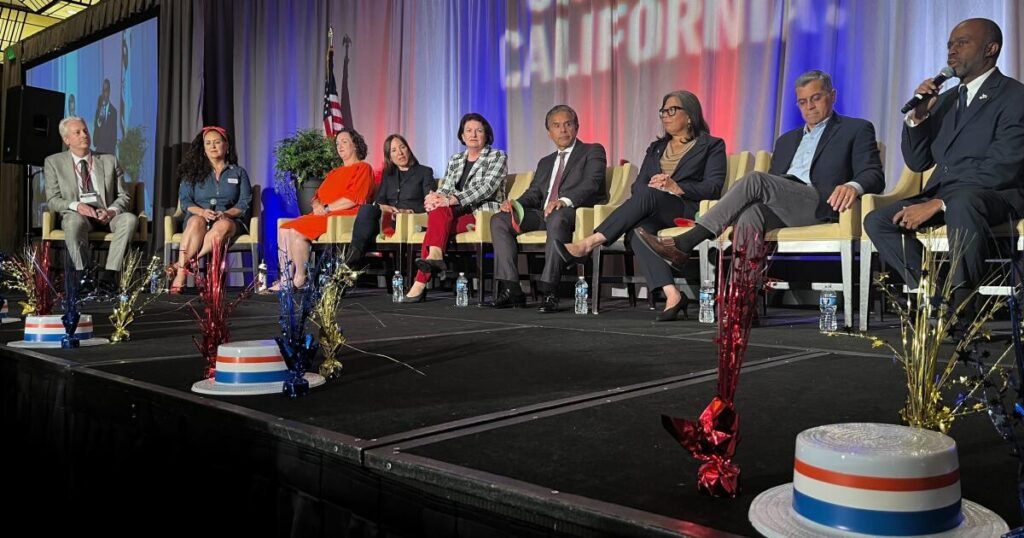California Governor’s Race Heats Up After Harris’ Exit
The recent announcement by former Vice President Kamala Harris to withdraw from the California governor’s race has opened up a significant political contest for the upcoming election. A survey conducted by UC Berkeley in collaboration with the Los Angeles Times reveals that many registered voters are still quite uncertain about who they will support in the 2026 election, particularly when it comes to backing Governor Gavin Newsom’s potential candidacy.
“There’s a lot of instability right now. Many voters are still undecided,” noted Mark DiCamillo, the director of the polls, adding that voters don’t seem to know much about the candidates yet.
Interestingly, among those who do have a preference, former Congresswoman Katie Porter holds a slight lead with 17% support, while Republican Chad Bianco has garnered 10%. DiCamillo pointed out that, even though Porter did not succeed in her 2024 Senate campaign, she has managed to maintain a small advantage over the pack as the primary date approaches, even though her overall visibility among Californian voters remains limited.
Bianco’s backing primarily comes from constituents concerned about public safety and crime, issues that resonate deeply with many Republican voters.
Other notable candidates in the race include former Health Secretary Xavier Becerra, former Los Angeles Mayor Antonio Villaraigosa, and California’s Superintendent of Public Instruction Tony Thurmond. A number of these candidates have only received single-digit support, including former state controller Betty Yi and businessman Stephen Crabeck, raising questions about their viability as front-runners.
In the aftermath of Harris’ decision, which shocked many who expected her to be a major contender, the survey reflects a shift in a race that was already anticipated to be intense. Additionally, Lieutenant Governor Eleni Kounalakis recently opted out, electing to pursue a state treasurer position instead.
“The landscape is pretty broad,” DiCamillo elaborated. “When we consider voters’ second-choice preferences, the dynamics could shift significantly.” In terms of ranking, when respondents were asked for their top two choices, Porter came first or second with 22%, followed by Becerra at 18% and Bianco at 15%.
Looking more closely, Californians seem to perceive the current set of candidates as relatively unknown compared to recent governors. There’s a notable contrast between these up-and-coming politicians and figures like Jerry Brown and Arnold Schwarzenegger, who enjoyed greater name recognition and public engagement.
The pivotal question lingering over this race is who else might join the fray, and whether figures like Caruso can self-sustain their campaigns financially, particularly before the filing deadline of March 6th.
Addressing the significant challenges ahead—largely driven by the Trump administration’s policies—will be crucial for whoever steps into this role. According to the poll, a prominent concern for voters remains the cost of living, with 36% citing it as the most pressing issue, while 25% of respondents highlighted the affordability of housing. Different partisan priorities also emerged: Democrats leaned toward concerns about democracy and climate change, while Republicans focused more on issues pertaining to crime and taxes.
Interestingly, the survey found that nearly 45% of registered voters expressed strong enthusiasm for Newsom running, compared to 36% for Harris. Furthermore, a significant portion of voters, approximately two-thirds, believes Harris should refrain from another presidential bid given her previous losses in the primaries.
In DiCamillo’s view, the overall sentiment suggests mixed feelings about Newsom among California voters; however, he noted a striking level of support within the Democratic base. As the political landscape continues to evolve, it remains unclear how candidates will position themselves, especially in a state facing both local and national pressures.
Conducted online from August 11 to 17, the Berkeley IGS poll included responses from 4,950 registered voters and has a margin of error of around 2%. As this race continues to unfold, the dynamics and strategies will surely shift as voters refine their preferences.







